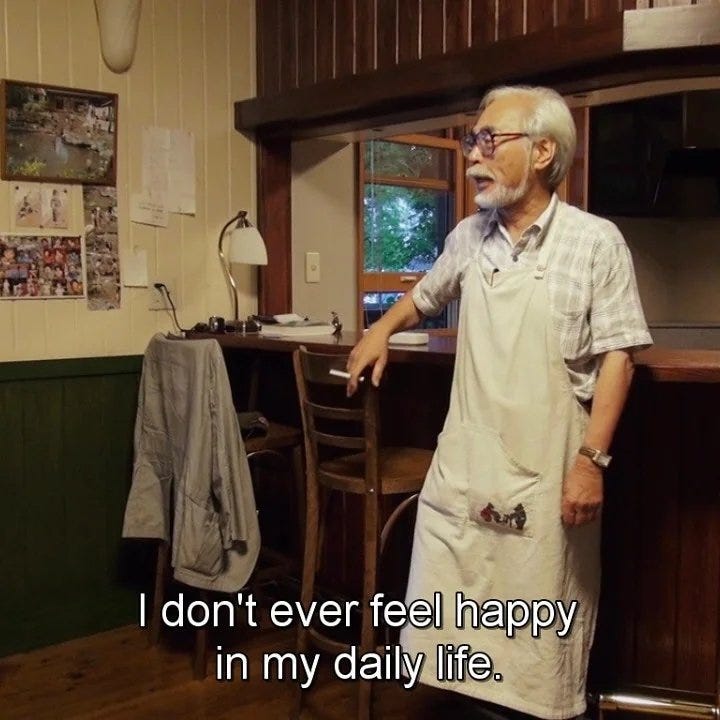IAMT #5: "Hayao Miyazaki and the Heron"
“If we don’t create, there’s nothing”
“Hayao Miyazaki and the Heron” does not make me feel envious of Miyazaki’s proficiency in the field, nor does his workaholic nature move me to feel more passionate about my own endeavors; neither are part of the central themes. Rather, it humanizes someone who is desperate to find purpose and understanding as he viscerally feels his own mortality.
In previous documentaries about Miyazaki(NHK’s “10 Years with Hayao Miyazaki”, “The Kingdom of Dreams and Madness”, and “The Never Ending Man: Hayao Miyazaki”), Miyazaki battles feelings of self-loathing while managing his selfish desire to create more movies.


Over the course of the nine years “Hayao Miyazaki and the Heron” encompasses, the number of memorial photos of deceased friends that are put up around the studio gradually increases. The pressure mounts from all the loved ones he’s lost; all he has connecting him to these people is his work. How can he preserve their legacy while his own body is deteriorating? The gradual decline of proficiency that comes with age isn’t framed pessimistically, though, but instead as a force of nature. The stove top turns from a gas to induction. The pre-schoolers that sing him happy birthday each year continue to change with a new class. He more frequently feels that his “brain is broken” and has incidents of faulty memory. He continues to lose friends to old age and cancer. His relationships that preserve his life’s history are gradually fading.

By far my favorite part of this documentary was the ending. The final scene for many of these documentaries was the press conference for the movie release, where Miyazaki would announce his retirement from film making. The dichotomy that this film draws for us is in a letter Miyazaki writes on the release day for “The Boy and the Heron”(or “How Do You Live” for the Japanese title) after the initial reviews are out.
“Miyazaki will keep making movies. No matter what it takes, he’ll go on.
He made that choice a long time ago. Stop whining and get moving.”
His inability to develop a healthy relationship with his craft pained him film after film, which resulted in repeated declarations of retirement. Known for his life-long dissatisfaction with himself and his own work, I’ve seen many creatives commiserate with his quotes from previous documentaries about his love-hate relationship with art.
In writing the letter above, Miyazaki reassures me that he is still growing and these end-of-life experiences are still having a profound influence on him. Ultimately, the creation of “How Do You Live” was painted as a journey of self-acceptance of one of the most stubborn, yet brilliant animators/directors of a generation.
There is so much love for him in this film. Posthumous clips of his deceased loved ones encouraging him and complimenting his work. Other skilled animators, voice actors, and singers explaining to Miyazaki how he’s influenced their lives for the better. Elementary schoolers telling him “My Neighbor Totoro” is their favorite movie. I can’t help but root for him, too.
Thank you for your hard work and I look forward to your next film, Mr. Miyazaki.
Less about movies next week.
- chib
“Hayao Miyazaki and the Heron” is on Max
“2399 Days with Hayao Miyazaki & Studio Ghibli” is on Youtube


Is my neighbor Totoro the actual title of the film? I could have sworn it was called something else.